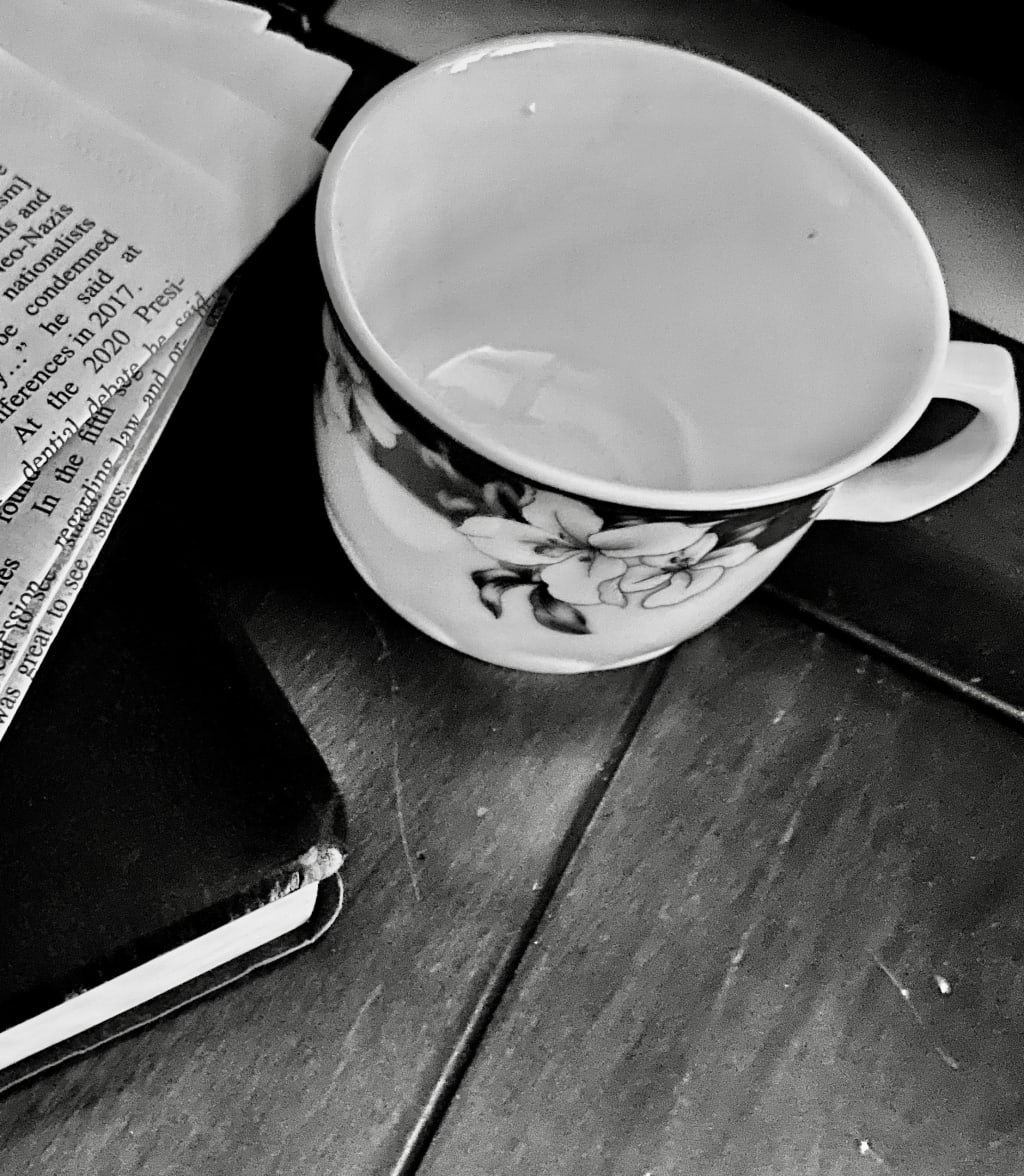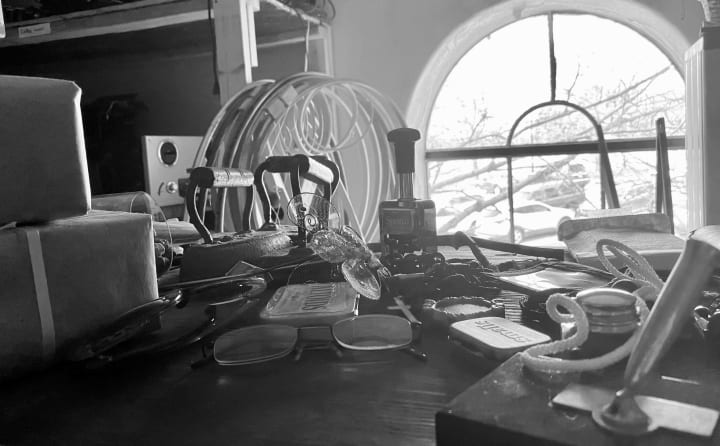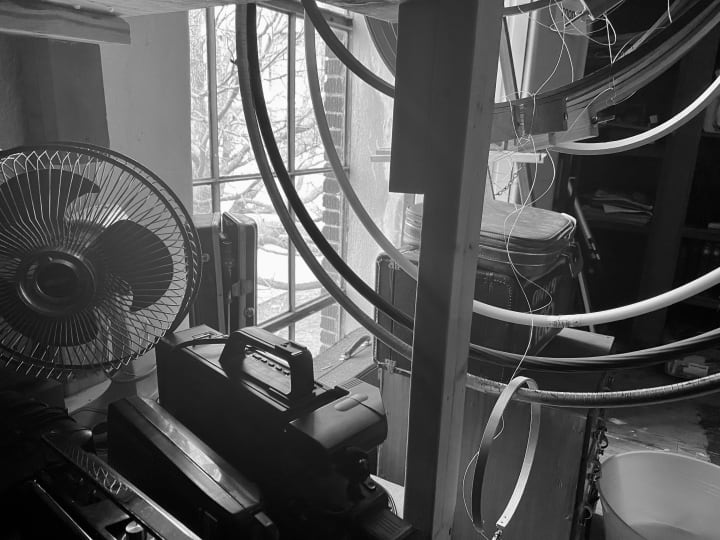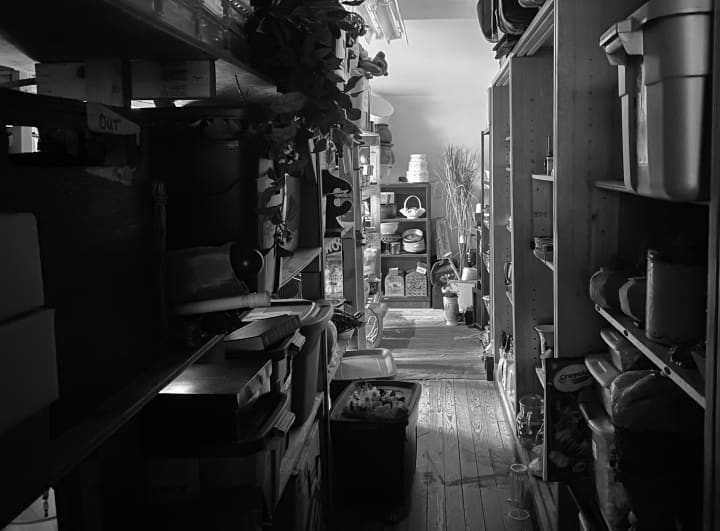My Father's House
A long journey of just a few steps

Ambivalence embraces me as I fumble around the attic of a strange house that is now mine. I engage a necessary task. I feel nothing. A thin, black moleskine is cold in my hand; it’s worn cover cracked from years that are lost to me. Left in the corner of my father’s attic, under a stack of The Sunday Times, it valiantly endured the seasons for perhaps a decade or more. The words “First Guaranty Bank: Carthage, Tennessee” fading from its cover, it is shrouded among cobwebs and dust bunnies, biding its time until this moment of revelation. Perhaps a forgotten piece of marketing tchotchke taking up residence with the other misfits in this attic? Misfits, like me.
My father has only been dead a week and just one day in the ground. I’m the sole survivor of the Bostwick estate, such as it is. My name is Richard; I go by Dick, as I have never been one for formalities. My mother Virginia, proceeded my father in death: lung cancer, as she picked up smoking when it was fashionable, a habit she shared with me. I am their only child, as their passion cooled not long after I was born. They stayed together for tax purposes or stubborn pride, I suppose. It’s hard to tell. Maybe both? My father lived on for another decade, wedded to his predictable routines, including golf on most Saturdays and the newspaper crossword on Sundays. His weekdays were passed by watching cable news, drinking an occasional cheap beer and little to no emotion, at least not of the productive varieties, habits he shared with me. His long career as a mail carrier provided some middleclass luxury in our lives, with some security in retirement, but mostly it was all aspirational—a charade to impress others who were never really paying attention. My father died alone. Just as I imagine I will.
The moleskine’s pages are empty, except for a drawing near the back where someone had crudely sketched out the floor plan of my parent’s home. By most standards the house was nice, a late design of the last century with the ever-present hint of upper middle-class ambition. They purchased the house shortly after I left home. I was seventeen. The incessant fighting finally got to me: theirs, mine, all of the above. I never spoke to my father or mother again, as it seemed pointless. They didn’t intend to change: neither did I. Father did send me a scribbled message when mother died, “Richard, your mother is dead.” It was signed, “James.” Not “Jim” or “Daddy,” just the formal, emotionless way my father would always speak. Distance was par for the course in my family.
After I left, I wandered around from place to place, one dead end job after another, failed marriages and complicated relationships, including with my own kids. Then one day, out of the blue, I get this call. I share my father’s last name, now I own his house. But for all practical purposes, I’m a stranger, a stranger who now owns a strange house. The key was given to me by a town attorney. Apparently, he and my father had been golfing buddies. “This is all he left; there are some taxes you’ll have to pay.” I suspect the attorney was expecting more from me, but I had nothing to give. I nodded and said “Thank you.”
I took the key from him and drove to the address, opened the door, and immediately walked up the narrow stair case to the second floor. I was purposefully looking for the attic, in hopes that something useful of my childhood may have survived. In our former home, I would often hide in the attic to escape my parent’s fighting.
I accessed the attic via the scuttle hole by pulling the string and unfolding the ladder. I climbed up into the attic that was filled miscellaneous boxes, broken furniture, and scattered remnants of my childhood. That’s when the collection of newspapers caught my eye. One of the few happy memories my father and I shared was a Sunday tradition that involved those newspapers. He would hide behind the news of the week, and dutifully fill out his crossword puzzle, but the Sunday funnies were always mine to read. On occasion, time was well wasted pressing silly putty onto the contoured lines and comical expressions of Garfield, Snoopy, or Beetle Bailey, and then peeling it off to reveal a perfect imprint. That memory lived now under that stack of perfectly preserved newspapers, it was also where the black moleskine caught my attention.

I would have laid it aside, had I not come across the mysterious sketch of the floor plan. It intrigued me, as each room had a randomly assigned number. There was a number one written in the attic, a number two in the upstairs bathroom, three in the master bedroom, four in the kitchen, and ended with five in the living room. Perhaps a discarded remodel plan?
Exiting the attic, I stepped into the upstairs bathroom. I stood at the sink picking up the bar of Irish Spring soap to wash my hands. That scent always made me think of my father, even if I was reluctant to do so. As I lathered the bar in my hands, I was suddenly five years old again, standing on my toes to reach the sink. “Anything that is worth doing is worth doing well!” he would say as he took my hands and put them together with the soap and washed my hands between his. I recalled my father’s touch, remembering the strength and gentleness of his hands, and for the first time I felt my father’s familiar presence lingering in this strange house.

I stepped out of the bathroom and turned into the master bedroom. On the nightstand was the only family picture from my childhood. I was ten; mom had purchased a ticket from a local church group for an Olan Mills portrait. I wore an orange sweater that made my neck itch, my father was in his blue suit with a wide red necktie, and mom wore her lavender dress with yellow sunflowers. The picture was as awkward as the events that led to it. Mother had announced at dinner that we had to get dressed to go to the church for the ten-dollar package she had purchased. We were sitting in front of the television eating meatloaf, watching Peter Jennings, when mom made this surprise announcement. “What the hell, woman?” my father exclaimed. Strangely, I don’t remember that it was a huge fight, certainly not like those that came before it, and definitely not like those that would follow. It was as if he acquiesced to mother’s desire in a strange dispensation of peace that was preceded by only one profanity. Strange the things I remember, and what I choose to forget. I was the only one smiling in the picture, I put the picture down and walked out of the room.
I headed back downstairs to the kitchen. The appliances were dated, but seemed to be in working condition. I opened the refrigerator. A carton of eggs, a few Michelob beers, various condiments and sauces and some left-over pizza populated the otherwise empty shelves. Seeing the beers prompted me to remember my first one. I was twelve, and my parents had screamed at each other for hours. When the fighting subsided, I came downstairs. I opened the refrigerator, grabbed one of the many Michelobs and popped the top. It was bitter and heavy, a drink unlike any other I had tasted, I forced myself to finish it out of curiosity if nothing else. The ensuing buzz was more imagined than real, but I strangely felt older, even though I was still several months shy of a whisker. Afterwards, I returned to my bedroom determined that my first beer wouldn’t be my last. The next morning, I was awakened by my father’s booming voice; “The next time you decide to steal one of beers, you’d better leave me a buck to cover my loss! Punk ass kid.” Apparently, he always knew exactly how many beers he had on hand.
I walked out of the kitchen and slumped down into my father’s favorite chair. It was the only piece of surviving furniture from our previous home now present in this new one. It was the chair where he died. His lawyer golfing buddy had found him there, when he didn’t make his tee time. The chair was worn, still holding the shape of my father’s torso, I turned on the lamp beside his chair. I sat there remembering many dark moments in a new light. My father carefully tended to the particulars of his life absent mother and absent me. He managed a life ordered by the mundane, and still found a way to enjoy golf on Saturdays, crosswords on Sundays, and by the care exhibited in the minutiae of his last moments deliver a key to his estranged prodigal son. My father’s intentionality made this strange home into a familiar space.

My ambivalence suddenly and violently turned to grief. I wept for the first time in years. A torrent of remorse opened up like a fire hose. “Daddy!” I screamed, “I hate you!"
No. Daddy, I love you.
Confused bellows of grief gave way to the clarity of love. This man wasn’t my father, distant, removed and dead; he was my daddy, present and alive in this house, in my heart.
Eventually, the tears relented and I attempted to compose myself by reclining in the chair. As I reflected on the unreconciled years and the long journey I had just made in only a few steps, it occurred to me that I had unintentionally followed the path of the numbers. The numbers randomly assigned to the rooms in that strange black book in the corner of the attic. Was it the power of suggestion, or had my father ordered my steps from the grave? When was that black book placed there? As I sat there staring at the lifeless television screen, I thought about what must have occupied my father’s thoughts in those last moments. He missed me.
I instinctively reached for the remote that I knew my father would predictably keep in the side of his chair. The remote was there, as was a sealed envelope to my surprise, a nondescript white envelope that simply read in my father’s distinctive handwriting, “To my Son.” The tears I sought to repress returned again.
I composed myself long enough to open and read,
“To my son,
I hope it is you.
For all the wrong, for all the lost time,
I’m sorry.
Your mother wanted you to have this.
She loved you.
-Love, Dad.”
Dad! It read “Dad!”
Attached to his note by a single paperclip was a deposit slip from a decade earlier. It was from First Guaranty Bank for $20,000, my share of a life insurance policy my mother had left me.
It is amazing how a strange place inhabited by memories can resurrect a dormant love. I can’t know what my father and mother’s combined lives were like after that day I left so many years ago; I do know that my life was much less than what I had wanted. I’m sure their life was as well. But in that strange house, because of my father’s small gesture of forethought, my family’s collective hurt was dissolved into healing. I resolved to make better decisions; I was determined to reach out to my children and make the effort to heal the hurts. I closed the door behind me a richer man, and it had nothing to do with the money.






Comments
There are no comments for this story
Be the first to respond and start the conversation.